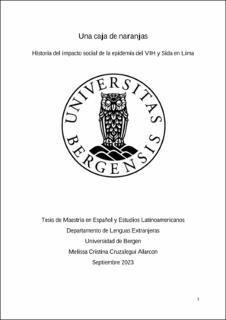Una Caja de Naranjas: Historia del impacto social de la epidemia del VIH y Sida en Lima
Master thesis
Permanent lenke
https://hdl.handle.net/11250/3097382Utgivelsesdato
2023-09-01Metadata
Vis full innførselSamlinger
- Master theses [201]
Sammendrag
Esta tesis de maestría es un estudio de historia social sobre la epidemia del VIH y Sida en Lima, Perú, la cual comenzó en 1983 y sigue hasta el día de hoy. Busca encontrar un panorama de como cambio la vida y como era la vida para las personas que sobrevivieron las primeras décadas de la epidemia, en particular personas diagnosticadas con el virus antes del 2010. Mediante una investigación cualitativa con un enfoque en entrevistar tanto a activistas de VIH como personas LGBT viviendo con VIH, esta tesis observa lo que ha cambiado en como el gobierno lidio con la epidemia desde el '83 hasta hoy, como la sociedad respondió a los infectados, y como compara la epidemia con la pandemia del COVID-19 hoy. Esta investigación muestra la marginalización, discriminación y desabastecimiento que tuvieron que aguantar las personas con VIH durante aquellas primeras décadas. En particular la poca ayuda que vino del estado, como las personas con VIH tuvieron que recurrir a otros actores para ser asistidos y como se unieron para demandar sus derechos médicos. This Master thesis is a social historical approach to the HIV and AIDS epidemic in Lima, Perú, which started in 1983 and is still happening. It seeks to find out a snapshot of how life changed and was like for the people who survived the initial decades of the epidemic, in particular people diagnosed before 2010. Through a qualitative investigation with a focus on interviews with both HIV activists and LGBT people living with HIV, this thesis looks at what changed in the way the government dealt with the epidemic from 1983 till today, how society responded to the ones infected, and how it compares with the COVID-19 pandemic of today. This investigation shows the marginalization, discrimination and scarcity people with HIV had to endure during those first decades. In particular the little help that came from the state, how people with HIV had to turn to other avenues to get assistance and how they banded together to demand their medical rights.
